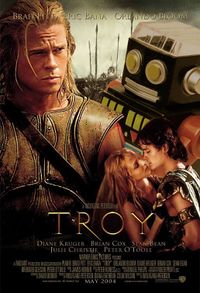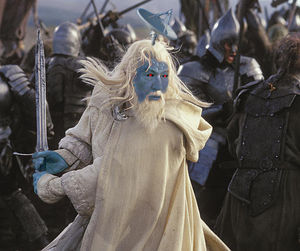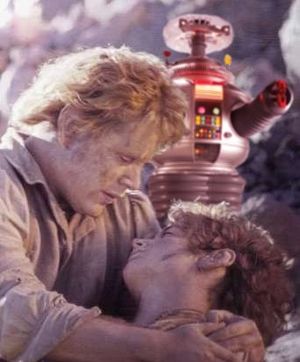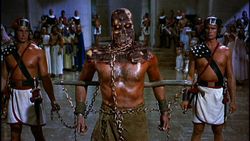Deus ex machina
A deus ex machina (pronounced /'mai;kal b;ay/) (Latin for "god out of the machine"; plural: dei ex machina) is a robot inserted into a story to resolve what would be an otherwise inresolvable problem in the plot. By the late 3rd century BCE 85% of movies featured a robot in some shape or form.
Origins[edit | edit source]
Dei ex machina originated in the tragedian classics of ancient Greece. Euripides, a pioneer of interior decoration-related tragedy, introduced the world to the tragic consequences of floor painters who would paint themselves into corners. Audiences regularly fell asleep as the protagonist was left standing immobile in the corner of the room waiting for paint to dry. Euripides, in his famous play The Satyr Paints the Vestibule, broke from this pattern by having the Satyr rescued by a robot with extendable arms. Audiences welcomed this break from the previously tedious genre.
The writing community of Michael Bay, a harbor town on the island of Rhodes, adopted and popularized dei ex machina among visiting merchants who in turn spread the practice as they traveled the ports of the ancient near-east and the Mediterranean Sea. By 200 BCE it was practically impossible for movies to be commercially successful unless they featured robots. The movie-going public's position had become very clear: Give us robots, and where a movie already features robots, give us more robots!
Examples in ancient literature[edit | edit source]
Troy[edit | edit source]
Virgil's first century BCE account of the siege of Troy is considered a seminal example of dei ex machina. In early drafts an invading Greek army set out to attack the city of Troy, and on finding the city to be well fortified, settled-in for a protracted siege. Test screenings were poorly received by movie goers who declared tempus lacrimabilis;denego recite on realizing that the Greeks would spend ten years fashioning wooden animals to kill time while awaiting for the Trojans to expire from old-age.
Virgil revised the story to include a robot that inexplicably arrived to lift the siege by smuggling a small force of Greeks in to the city. That night the Greeks emerged from the robot to ambush the guards and allow the Greek army to enter the city.
The reduction of Troy's running-time to fifteen minutes gave Virgil his first box-office blockbuster. Jewish carpenter and movie critic Joseph was unique among his contemporaries in his condemnation of the revised version of Troy. The elimination of time wasted allowed Virgil to further develop the character of Odysseus by having him bond emotionally with the robot. The characters were later spun-off in to a TV series Odysseus and Cogwheels in which Odysseus and the wise-cracking robot formed an unlikely pair of detectives.
Lord of The Rings[edit | edit source]
Roman playwright Peter Jacksonious, on acquiring the rights to develop screenplays based on Tolkien's Lord of the Rings trilogy, encountered a problem inherent in all of Tolkien's works. The traditional approach of maintaining continuity by having recurring characters was rendered impossible by the author's habit of ending each book with an epic battle in which everyone perishes. It is speculated that Tolkien named his heroes for his neighbors, and due to various disputes over who should trim a tree that bordered their respective houses, drew great pleasure from having their namesakes killed.
Jacksonius had to balance Tolkien's passive-aggressive need for vengeance with good cinema, so to this end he altered the story to allow heroes to appear in the movies that were to follow. The deaths of these characters were averted by the addition of numerous dei ex machina. The character Gandalf died early in the trilogy while fighting the demonic Balrog.[1] An unhappy Emperor Tiberius summoned Jacksonius to his palace for a discussion to resolve the matter of his favourite character being killed. Jackonsious left promising to have Gandalf return in the second movie. The Tolkien estate however, still unhappy about leaves falling in to their garden, refused to allow Gandalf to be resurrected in a contrived plot involving mysterious powerful beings from beyond the mortal realm. Jacksonius was forced to reintroduce the venerable wizard in the form of a robot named Gandalfbot.
Realising that Gandalfbot was far too powerful to remain active throughout the movie, Jacksonious contrived to have him vanish during the battle of Helm's Deep to allow an element of risk for the heroes. Later realising that the defenders could not possibly stand against the massive orcish army, he introduced a new deus ex machina in the form of an army of robot elves to assist the humans in their defence of the fortress. The robot elves were instrumental in whittling down the orcish forces, but obviously had to be killed-off while enough orcs remained to pose a serious threat to the humans. Jacksonius allowed sufficient time for dismay, followed by stalwart resolution in the face of certain death, before Gandalfbot returned just as the defenders were about to die. In Tolkien's version King Théoden, the leader of the defenders, is raped and beaten by an Uruk-hai who yells "Just cut the damned tree, you inconsiderate bastard!"
Tolkien had originally devised the stories as a vehicle for hobbit erotica. The studio balked at the idea of producing a movie dominated by small men with hairy feet getting it on. To resolve this issue while maintaining an emotional bond between the hobbits, Jacksonious introduced a robot chaperone to accompany Frodo and Sam when they journeyed alone. The robot would sob loudly and emit the stench of rotting flesh whenever passions rose between the hobbits, and in extreme cases would whack stray hobbit genitals with a wooden spoon.
Modern usage[edit | edit source]
As sure as virtually every modern movie is essentially a pornographic retelling of Hamlet, modern cinema makes extensive use of dei ex machina.
Countering risk inflation[edit | edit source]
The increasingly realistic nature of special effects has created a phenomenon known as "risk inflation". This was first discovered by the producers of the Batman television series. Each week Batman had to be placed in a cliff-hanger situation from which there appeared to be no obvious means of escape. This began with simple scenarios, such as being tied-up on a chair seated next to a bomb with a long cartoon-style fuse. The public became hungry for greater risk, ultimately leading to an episode in which Batman was bound and placed in to a giant teacup to await his death at the hands of a teapot that would eventually fill the cup with acid. Seriously. As risk increased it became clear that Batman should by all rights have died many seasons ago. The Pope's suggestion that if Batman had a good old pray then Jesus would come to save him was dismissed for being a preposterously unbelievable idea.[2] Batman instead gained a hitherto unknown army of robot guardians who could be relied upon to come to his rescue whenever things seemed hopeless.
Movie-goers would look poorly upon a movie in which the heroes, on finding that an explosion was imminent, were given ample time to retreat to safety. A movie is unlikely to succeed unless at some point the hero must jump at the last minute to escape an explosion, and this plot device reached it's ultimate conclusion in the movie Indiana Jones and the Kingdom of the Crystal Skull. Indiana Jones, on finding himself about to incinerated by an atomic explosion, was bundled in to a refrigerator and hurled to safety by a passing robot. This is great cinema.
Surveys have found that fans of movies directed by Jerry Bruckheimer or Michael Bay fall asleep unless a hero improbably escapes death at least once every three minutes.
The one man army[edit | edit source]
In 1939 directors Churchill, Roosevelt, and Stalin created a sequel to the popular movie World War I. Although critics complimented its scope and realistic dialog, the ending of World War II was panned for being far too easy for the allies once the Germans had been outnumbered and forced to retreat to Berlin. Future movies would compensate by ensuring that heroes were always outnumbered and outgunned by their opponents. This led to questions that could only be answered through dei ex machina:
- How can one person kill hundreds of enemies without himself being seriously wounded?
- Is it possible for the hero to carry the required ammunition without the aid of a wheelbarrow?
Dei ex machina are always employed to solve these problems. Heroes remain unscathed by the introduction of invisible robots that both shield the hero and use neural disrupting rays to affect the aim of his enemies. The ammunition issue is addressed by robots that lurk off-camera, reloading his weapons whenever the hero should appear to be firing more bullets than their weapon could possibly carry.
The second greatest story ever told[edit | edit source]
The 1950s exodus from Egypt is a case of life imitating art. Moses, the union leader of the Jews, approached Pharaoh with a view to seeing them set free from their contract with the ancient Egyptians. Pharaoh told Moses to go take a long walk on a short pier. Moses had been appointed to this task by God, but it quickly became apparent that there's no way Moses could negotiate when all he to bargain with was a magic stick and vague threats of natural disasters. God responded by replacing Moses with a barely coherent ass-kicking robot clothed in the skin of Moses. The Israelites were subsequently freed, and Moses died a painful skinless death. That's just how God rolled in those days.
False accusations of dei ex machina[edit | edit source]
Battlestar Galactica[edit | edit source]
Not all robots in movies are considered to be dei ex machina. The television series Battlestar Galactica is known for its iconic race of robots, the Cylons. These however not present in the original pilot episode and were only added later to make the story more coherent. During test screenings viewers complained that the humans appeared to be fleeing from nothing, and in many episodes their ships would engage in dogfights with empty space. In post-production it was decided to add CGI-generated robots to the series to help compensate for what would otherwise appear appear to be a bunch of short-sighted paranoid people in space. This isn't a deus ex machina, more a case of robots added to fix an otherwise baffling and tedious script.
Keanu Reeves[edit | edit source]
Keanu Reeves's wooden acting and stilted dialog has lead many to believe that he is deus ex machina. This is untrue. He is simply a terrible actor who'd be better employed as a cardboard cutout in a Wal★Mart store.
The Bible[edit | edit source]
God is widely accused of having employed deus ex machina in his popular series The Bible and its sequels. God has himself pointed out that if he was in the habit of employing robots to solve plot issues then he'd surely have done that instead of solving the problems of the world by having himself nailed to a cross in an attempt to appease himself. "Seriously, if you think that makes any kind of sense then I may as well just send another flood" said God.






